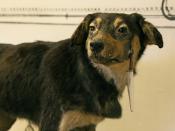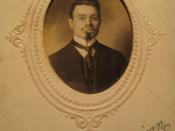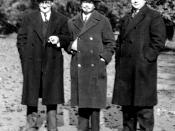On September 14, in the year 1849, Ivan Petrovich Pavlov was born in a small village in Ryazan, Russia. Pavlov was originally going to follow in his father's footsteps, to enter priesthood, and even enrolled in a theological seminary, but after reading some works of Charles Darwin, Ivan left the seminary for the University of St. Petersburg in 1870. Pavlov completed a third course of study at the Academy of Medical surgery, and was awarded his first gold medallion. He began to pursue studies in Physiology and chemistry. He also discovered dynamic nerves of the heart and submitted thesis for the degree of Doctor of Medicine. In 1879, he received his doctorate and continued studies in topics like blood circulation because of an interest in that area. He eventually began doing is own research that became very well known, and later was appointed professor of physiology at the Imperial Medical Academy.
Pavlov began a study in digestion that would, in later years, be the reason why he would become a household name. While looking at the digestive process in dogs, especially the interaction between the stomach and salivation, he came to a realisation of how closely liked they were by reflexes in the autonomic nervous system. Pavlov noticed that without salivation, the stomach didn't start the digestion process. He wanted to see if external stimuli could affect this process. By ringing a bell at the same time he gave the experimental dogs their food; over a long time period, he noticed that when he rang the bell, the dogs would begin to salivate, even if no food was there at the time.
In the Year 1903, Ivan published hid findings calling this a "conditioned reflex"� different from innate reflex. He mentioned in it that if the bell were rang...


